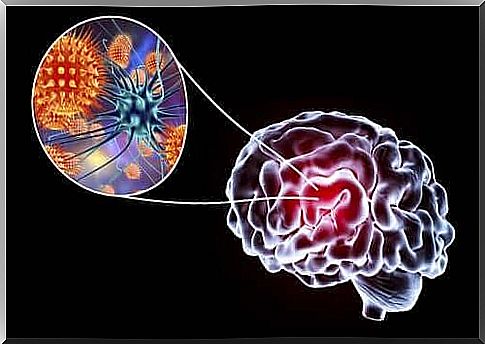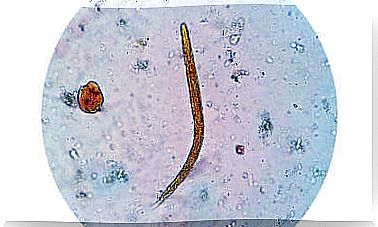Encephalitis: Symptoms, Causes And Treatment

Encephalitis is a disease that consists of inflammation of the brain. It is normally caused by a viral infection, although it can have many other causes. It is usually a complication caused by infectious diseases.
Fortunately, encephalitis is uncommon. In recent years, the number of cases has decreased significantly thanks to extensive vaccinations and official vaccination schedules. But despite all this, the part of the population most affected by this disease is children.
Experts estimate that there are between 5 and 10 cases per 100,000 children. Unfortunately, the majority of these cases happen during the first year of life. It is a complicated situation that endangers the life of the person who suffers from it.
Both the causes and the symptoms can be confusing and it is essential to detect it early to avoid serious consequences. For this reason, we explain what encephalitis is and what its causes and symptoms are and what the treatment is.
What Causes Encephalitis?
As we mentioned, encephalitis is the inflammation of brain tissue. It is a condition that can have several causes, although in the vast majority of cases it is caused by a virus. However, a bacterial infection can also cause it.
When the infection occurs directly in the brain, it is called primary encephalitis. However, it is also possible that the infection starts in another part of the body and then affects the brain through migration. This is called secondary encephalitis.
The viruses that usually cause it in children are measles, mumps and rubella. Fortunately, there are vaccines for those diseases. Other causes are:
- Herpes virus: Herpes simplex, Epstein-Barr virus, or varicella (chickenpox) can cause it.
- Rabies virus: This is usually transmitted through an animal bite.
- Enteroviruses: think of poliomyelitis, for example.
- Bacterial meningitis: if not treated properly.
- parasites.
It is important to emphasize that encephalitis itself is not a contagious disease. However, it is often caused by an infectious disease. As we mentioned before, it can also result from other conditions, such as cancer.

What are the symptoms?
Since most cases are caused by a virus, the initial symptoms can vary and be vague. For example, a typical case shows:
- Fatigue
- muscle strain
- Headache
- Fever (in most cases)
As the condition progresses, the symptoms normally become more intense. You may experience seizures, loss of consciousness and even speech problems. In addition, many patients lose sensation in parts of their bodies.
In the case of babies, it can be very difficult to notice the symptoms. Children normally show:
- Irritability
- Vomit
- Not eating well
In the most severe cases, it can lead to coma. If left untreated, encephalitis causes death.

How do you treat encephalitis?
To diagnose this disease, doctors need to perform various tests and examinations. First, they have to do blood and urinalysis. This then allows them to make their diagnosis and understand the possible causes.
They normally do an MRI or CAT scan to observe the brain. In some cases, they need to do a lumbar puncture (epidural). With this procedure, they extract the cerebrospinal fluid, which when analyzed in a lab can confirm the cause.
To treat it, the first thing to do is to keep the person stable and rest. Treatment includes pain-relieving medications such as acetaminophen and nonsteroidal anti-inflammatory drugs (NSAIDs).
What should you do if you have symptoms of encephalitis?
Although it is difficult to diagnose it in children, some signs can point your suspicions away. In adults, you will notice an intense headache and fever, in addition to some changes in cognitive functions.
There are some viruses that cause encephalitis and for which there is a specific treatment. However, that is not always the case. It is very important that whenever you are faced with a symptom, you see your doctor. Encephalitis can put your life at risk.









